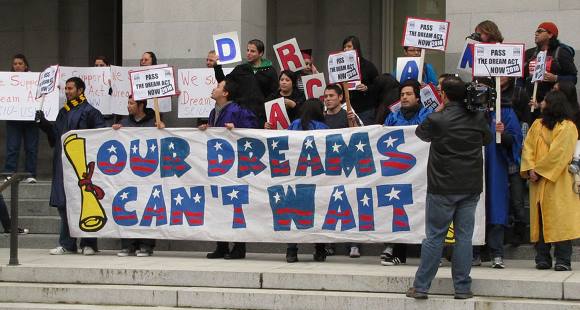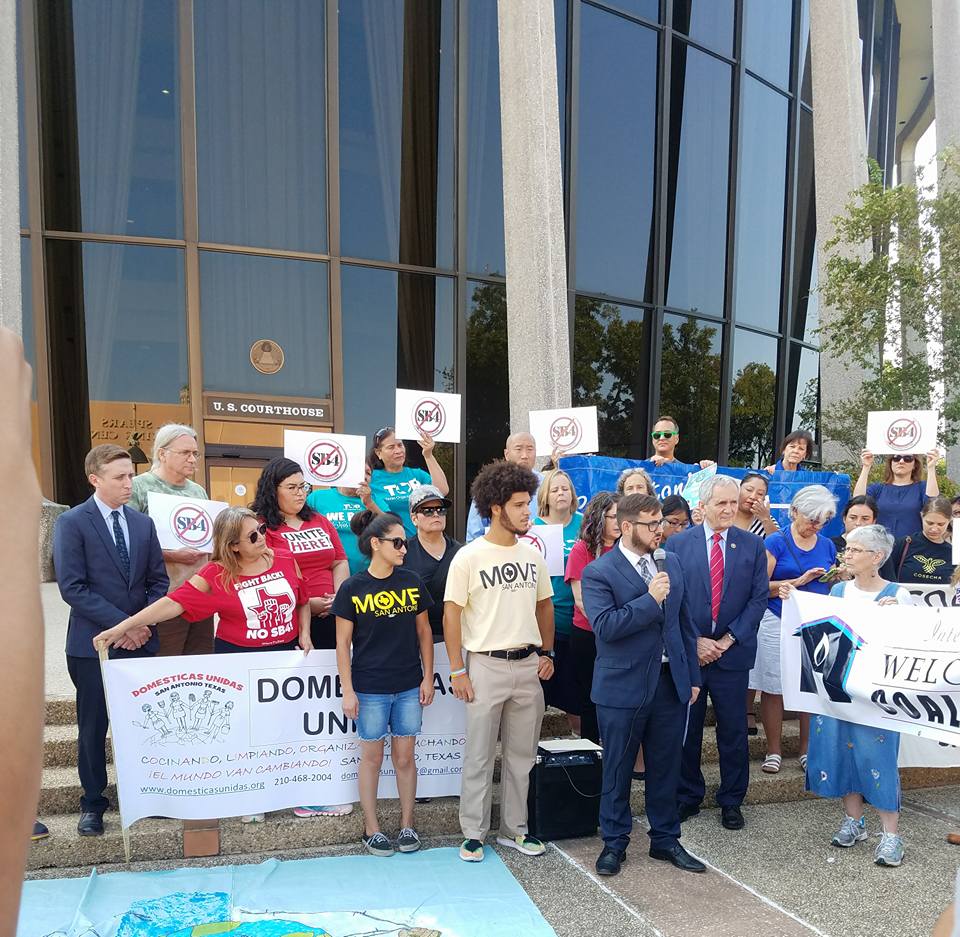The future of nearly 800,000 young people is under threat as President Donald Trump phases out the program giving work permits and deportation relief to Dreamers, young immigrants brought to the United States as children.
No new applications will be accepted, the administration announced today. Young people will lose their DACA status as soon as their permits, which are granted for two years, expire.
Some youth-led organizations shifted into high gear to protest, and some youth-serving organizations have rallied to the defense of young immigrants.
“I’ve been preparing for this since the second [Trump] was elected,” said Andrea Fernandez, a 22-year-old student and DACA recipient at the University of Texas at San Antonio.
DACA, Deferred Action for Childhood Arrivals, is the executive order issued in 2012 that offers a renewable two-year protected status to undocumented young people who arrived before 2007 and before age 16.
Fernandez came to San Antonio from Mexico City with her family when she was 9. She now faces an uncertain future. She isn’t sure whether she will be able to complete her remaining 1½ years of college, where she is studying public policy.
It will take a lot of effort for her “not to hate the man who is ruining our lives,” she said, referring to Trump.
Fernandez began working with the youth-led civic group MOVE San Antonio this summer. She’s spoken at protests and rallies and plans to lead “know your rights” education groups for immigrants.
“I will be speaking out in front of more people,” she said. “The most important thing is not to panic. Then we would not be able to mobilize.”
She faces risks for speaking out. She has already closed her Twitter account because she was getting messages from people calling for her deportation.
“The worst case is an immigration force comes after us,” she said. “We gave them all our information [when we registered for DACA].”
Because of the risk, “not a lot of people are willing to come out of the shadows,” she said.
Fernandez’s college, the University of Texas at San Antonio, has the second-highest proportion of DACA students among U.S. colleges, according to MOVE San Antonio.
California and Texas have the highest number of DACA recipients, according to the Pew Research Center, followed by Illinois, Florida, Arizona, New York, North Carolina and Georgia.

A demonstration held by youth-led civic group MOVE San Antonio.
Some youth-serving organizations speak out
A few national youth-serving organizations have spoken out regarding DACA. The YWCA and Girls Inc. signed a letter in support of Dreamers sent by elected officials and civic leaders to Trump.
YWCA interim CEO Casey Harden also issued a statement saying:
“To go back on the promise the United States made to these young people would be shameful and morally wrong. … At YWCA, we see this for what it is: racial profiling, xenophobia, and bad public policy. We must stand by young women of color and ensure that they have access to every opportunity by protecting DACA and pursuing a permanent solution through the DREAM Act.”
Advocates for Youth, a national nonprofit that focuses on adolescent sexual health, issued a strongly worded statement last week: “Every week brings a new outrage against those who would come here to build a new life.”
President Debra Hauser wrote that immigrant youth are being stigmatized. They deserve to live with dignity and respect and be able to realize their potential, she said.
“If DACA is revoked, tens of thousands of children and youth will be ripped from the only home they have ever known and sent to countries where they have no roots and often very little in the way of support systems,” wrote James Jimenez, executive director of New Mexico Voices for Children, in an email. It’s a nonprofit organization founded in 1987 by a group of pediatricians to advocate for public policies that improve the wellbeing of children in the state.
About 6,800 young people in the state have registered for DACA, he said. Immigrants come to the United States for opportunity, just as previous waves of immigrants did, and most are hard-working, he said.
Texas law temporarily blocked
Immigrant advocacy groups in Texas celebrated a victory last week when the “show me your papers” law scheduled to take effect last Friday was temporarily blocked by a federal court. Known as SB 4, it required local police and college campus police to ask about immigration status and report it to Immigration and Customs Enforcement.
MOVE San Antonio became a co-plaintiff in the lawsuit to overturn SB 4.
“It makes local police and college police into immigration officers,” said Drew Galloway, executive director of MOVE San Antonio, which was organized in 2007 to push for voter registration among young people.
“Since the beginning of the year, we have been hearing a tremendous amount of anxiety in immigrant youth around SB 4,” he said. “We have seen an influx of immigration-focused student organizations.”
The Alliance for Youth Action, an umbrella organization, is supporting eight local affiliates in its network of groups that campaign to register millennials to vote.
“We know our undocumented peers are being threatened,” said Sarah Audelo, executive director of the Alliance for Youth Action. “We know we need to band together to say ‘We have your back.’”
Efforts to end DACA “reflect a larger White Nationalist agenda,” she wrote in a statement. Other groups should step up, she said.
This story has been updated.
































